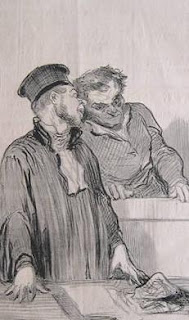Thursday, June 23, 2011
What We Say, Not What We Do
 This is delicious.
This is delicious.Remember how Casey Luskin, Gofer General of the Discovery [sic] Institute was accusing "Darwinists" of engaging in "conspiracy theories" because they suspected that Intelligent Design advocates had brought pressure on the Editors-in-Chief of Synthese to issue a "disclaimer" concerning "Evolution and Its Rivals"? Ignore the fact (as Casey always does) that it was the community of philosophers who were most exercised about the disclaimer and the unprofessional way it was handled and especially ignore the fact that the EiCs themselves stated that they received "messages that we take seriously as legal threats."
So, now we have this.
Texas, El Paso mathematics professor Granville Sewell, had a paper accepted for publication by the journal Applied Mathematics Letters.When questions were raised as to why the journal would publish an article that trods the well-worn creationist path of "the Second Law of Thermodynamics proves evolution can't happen," the paper was retracted. You can judge the correctness of the original acceptance and subsequent retraction for yourself. Blog posts by the person who first wrote to the journal editors can be found here and here. The Panda's Thumb deals with the inanity of Sewell's arguments here and why his article should never have been accepted here. Most recently, Jason Rosenhouse has dealt with Sewell's most recent attempt to dumb down American students by getting is guff into
For a lawyer like myself, though, the interesting point was Sewell's reaction to the decision not to publish the article. This Texas professor showed up on the doorstep of a European publisher with a California lawyer threatening a lawsuit. But in the Synthese affair, it was Casey's contention that there was no "nefarious conspiracy involving pressure originating with ID proponents."
If you are going to take that position, maybe you shouldn't crow when the pressure originating with ID proponents sorta* works.
_________________________________________
* The publisher (or, more likely, its insurance company) apparently paid Sewell $10,000 but his article was still not published and, as Jason notes, the editors of American Journal of Physics are now also wise to him. From long experience, $10,000 is a figure that any insurance company will pay to make a litigant go away, no matter how dubious the claim, because that is what it'll cost it to hire an attorney to open a file, answer the complaint and file a motion to dismiss.
Of course, the down side is that we'll now have to listen to the IDers claim that the reason they don't publish in peer-reviewed scientific journals (while simultaneously claiming that they do) is because the evil "Darwinists" prevent them from doing so.
.
Comments:
<< Home
I love it when Sewell posts the reviews he gets of his nonsense. The American Journal of Physics apparently just rejected some silliness he wrote on the 2LoT:
I do not see any educational value in your manuscript. Because it is well established in the physics community that there is no conflict between the second law of thermodynamics and evolution, we can consider manuscripts which help students understand why. However, papers that promote views that are contrary to accepted understanding in physics should be sent to research journals not to AJP.
http://www.uncommondescent.com/intelligent-design/poker-entropy-and-the-theory-of-compensation/
The real question: why didn't Applied Mathematics Letters just do this straight away? I daresay they knew nothing about 2LoT and creationism and therefore gave it a pass until bloggers pointed out the problem.
I do not see any educational value in your manuscript. Because it is well established in the physics community that there is no conflict between the second law of thermodynamics and evolution, we can consider manuscripts which help students understand why. However, papers that promote views that are contrary to accepted understanding in physics should be sent to research journals not to AJP.
http://www.uncommondescent.com/intelligent-design/poker-entropy-and-the-theory-of-compensation/
The real question: why didn't Applied Mathematics Letters just do this straight away? I daresay they knew nothing about 2LoT and creationism and therefore gave it a pass until bloggers pointed out the problem.
The American Journal of Physics apparently just rejected some silliness he wrote on the 2LoT
Yeah, that was the complaint by Sewell that Rosenhouse dealt with. I misread Jason and thought Sewell had gone back to Applied Mathematics Letters.
The real question: why didn't Applied Mathematics Letters just do this straight away?
First, the journal prides itself on "fast track" (i.e. rushed) publication. Sewell is actually a respected mathematician in his own field and the reviewer(s) probably weren't familiar with the science of evolution (and creationist arguments against it) and probably thought Sewell had something new and interesting to say.
In other words, they gave Sewell a pass.
Post a Comment
Yeah, that was the complaint by Sewell that Rosenhouse dealt with. I misread Jason and thought Sewell had gone back to Applied Mathematics Letters.
The real question: why didn't Applied Mathematics Letters just do this straight away?
First, the journal prides itself on "fast track" (i.e. rushed) publication. Sewell is actually a respected mathematician in his own field and the reviewer(s) probably weren't familiar with the science of evolution (and creationist arguments against it) and probably thought Sewell had something new and interesting to say.
In other words, they gave Sewell a pass.
<< Home




